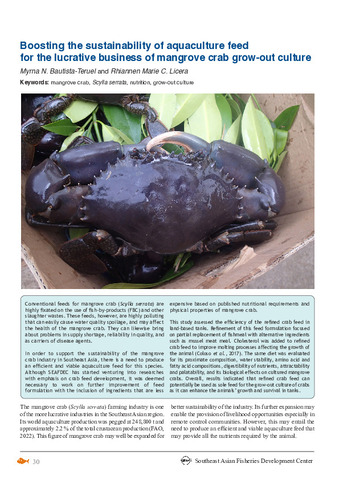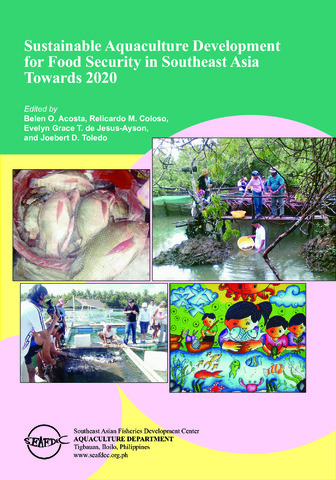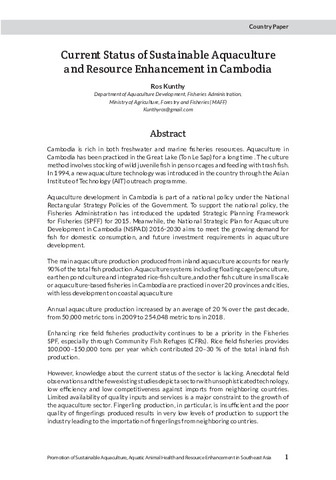| dc.contributor.author | Coloso, Relicardo M. | |
| dc.contributor.editor | Romana-Eguia, Maria Rowena R. | |
| dc.contributor.editor | Parado-Estepa, Fe D. | |
| dc.contributor.editor | Salayo, Nerissa D. | |
| dc.contributor.editor | Lebata-Ramos, Ma. Junemie Hazel | |
| dc.date.accessioned | 2016-01-20T07:38:55Z | |
| dc.date.available | 2016-01-20T07:38:55Z | |
| dc.date.issued | 2015 | |
| dc.identifier.citation | Coloso, R. M. (2015). Feed formulation for sustainable aquaculture. In M. R. R. Romana-Eguia, F. D. Parado-Estepa, N. D. Salayo, &M. J. H. Lebata-Ramos (Eds.), Resource Enhancement and Sustainable Aquaculture Practices in Southeast Asia: Challenges in Responsible Production of Aquatic Species: Proceedings of the International Workshop on Resource Enhancement and Sustainable Aquaculture Practices in Southeast Asia 2014 (RESA) (pp. 223-230). Tigbauan, Iloilo, Philippines: Aquaculture Department, Southeast Asian Fisheries Development Center. | en |
| dc.identifier.isbn | 9789719931041 | |
| dc.identifier.uri | http://hdl.handle.net/10862/2777 | |
| dc.description.abstract | As aquaculture production of tropical fish and crustacean species becomes more intensified, practical diets need to be formulated to be cost effective and environment-friendly. Ingredients should be included to satisfy the nutrient requirements of the animal, promote optimal fish growth, and boost the income of small-scale farmers and commercial producers with minimal impacts to the surrounding environment. Feed formulation for sustainable aquaculture should aim at increasing aquaculture system performance and profitability, enhancing the animals disease resistance, increasing attractability, palatability, and digestibility of practical diets, and maintaining environmental quality through sound feeding management and good aquaculture practices. More vigorous research and development efforts need to be supported to generate feed technologies that will ensure a steady and reliable supply of safe and high quality aquaculture products to the public while preserving the environment. | en |
| dc.language.iso | en | en |
| dc.publisher | Aquaculture Department, Southeast Asian Fisheries Development Center | en |
| dc.subject | Practical diets | en |
| dc.subject | Feed formulation | en |
| dc.subject | Sustainable aquaculture | en |
| dc.title | Feed formulation for sustainable aquaculture | en |
| dc.type | Conference paper | en |
| dc.citation.spage | 223 | |
| dc.citation.epage | 230 | |
| dc.subject.asfa | Diets | en |
| dc.subject.asfa | feed preparation | en |
| dc.subject.asfa | feeds | en |
| dc.subject.asfa | aquaculture development | en |
| dc.subject.asfa | nutritional requirements | en |
| dc.subject.asfa | crustacean culture | en |
| dc.subject.asfa | environmental impact | en |
| dc.subject.asfa | disease resistance | en |
| dc.subject.asfa | sustainability | en |
| dc.subject.asfa | fish culture | en |
| dc.subject.asfa | environmental protection | en |
| dc.subject.asfa | feed composition | en |
| dc.citation.conferenceTitle | Resource Enhancement and Sustainable Aquaculture Practices in Southeast Asia: Challenges in Responsible Production of Aquatic Species: Proceedings of the International Workshop on Resource Enhancement and Sustainable Aquaculture Practices in Southeast Asia 2014 (RESA) | en |



